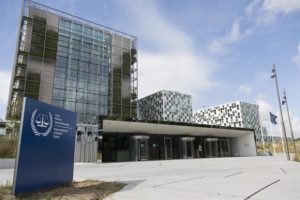 Today, 9 November 2017, Pre-Trial Chamber III of the International Criminal Court (ICC) issued a public redacted version of its decision authorising the ICC Prosecutor to open an investigation regarding crimes within the jurisdiction of the Court allegedly committed in Burundi or by nationals of Burundi outside Burundi since 26 April 2015 until 26 October 2017.
Today, 9 November 2017, Pre-Trial Chamber III of the International Criminal Court (ICC) issued a public redacted version of its decision authorising the ICC Prosecutor to open an investigation regarding crimes within the jurisdiction of the Court allegedly committed in Burundi or by nationals of Burundi outside Burundi since 26 April 2015 until 26 October 2017.
The Pre-Trial Chamber found that the Court has jurisdiction over crimes allegedly committed while Burundi was a State party to the ICC Rome Statute. Burundi was a State Party from the moment the Rome Statute entered into effect for Burundi (1 December 2004) until the end of the one-year interval since the notification of Burundi’s withdrawal (26 October 2017). The withdrawal became effective on 27 October 2017. Accordingly, the Court retains jurisdiction over any crime within its jurisdiction up to and including 26 October 2017, regardless of Burundi’s withdrawal.
As a consequence, the Court may exercise its jurisdiction even after the withdrawal became effective for Burundi as long as the investigation or prosecution relate to the crimes allegedly committed during the time Burundi was a State Party to the Rome Statute. Moreover, Burundi has a duty to cooperate with the Court for the purpose of this investigation since the investigation was authorised on 25 October 2017, prior to the date on which the withdrawal became effective for Burundi.
Pre-Trial Chamber III considered that the supporting materials presented by the ICC Prosecutor, offer a reasonable basis to proceed with an investigation in relation to crimes against humanity, including: a) murder and attempted murder; b) imprisonment or severe deprivation of liberty; c) torture; d) rape; e) enforced disappearance and f) persecution, allegedly committed in Burundi, and in certain instances outside of the country by nationals of Burundi, since at least 26 April 2015.
The Chamber noted that, according to estimates, at least 1,200 persons were allegedly killed, thousands illegally detained, thousands reportedly tortured, and hundreds disappeared. The alleged acts of violence have reportedly resulted in the displacement of 413,490 persons between April 2015 and May 2017.
The crimes were allegedly committed by State agents and other groups implementing State policies, including the Burundian National Police, national intelligence service, and units of the Burundian army, operating largely through parallel chains of command, together with members of the youth wing of the ruling party, known as the “Imbonerakure”.
The ICC Prosecutor is not restricted to the incidents and crimes described in the decision but may, on the basis of the evidence, extend her investigation to other crimes against humanity or other crimes within the jurisdiction of the Court (i.e. genocide or war crimes), as long as she remains within the parameters of the authorised investigation.
Moreover, the Chamber noted that, according to available information, the Burundian authorities have remained inactive in relation to potential cases arising out of the situation in Burundi. Despite the establishment of three commissions of inquiry and certain proceedings before domestic courts, the Chamber found that these steps were either deficient or did not concern the same persons or the same crimes that are likely to be the focus of an ICC investigation. Accordingly, there is no conflict of jurisdiction between the Court and Burundi.
